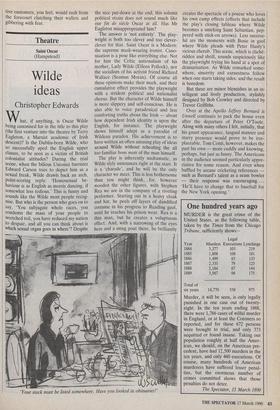Theatre
Saint Oscar (Hampstead)
Wilde ideas
Christopher Edwards
What, if anything, is Oscar Wilde being canonised for in the title to this play (the first venture into the theatre by Terry Eagleton, a Marxist academic of Irish descent)? Is the Dublin-born Wilde, who so successfully aped the English upper classes, to be seen as a victim of British colonialist attitudes? During the trial scene, when the bilious Unionist barrister Edward Carson tries to depict him as a sexual freak, Wilde drawls back an arch, point-scoring reply: 'Homosexual be- haviour is as English as morris dancing, if somewhat less tedious.' This is funny and sounds like the Wilde most people recog- nise. But who is the person who goes on to say, 'You subjugate whole races, you condemn the mass of your people to wretched toil, you have reduced my nation to despair, and all you can think about is which sexual organ goes in where'? Despite the nice put-down at the end, this solemn political strain does not sound much like our fin de siecle Oscar at all. Has Mr Eagleton misappropriated him?
The answer is 'not entirely'. The play- wright is both too clever and too clever- clever for that. Saint Oscar is a Modern: the supreme mask-wearing ironist. Cano- nisation is a pose like everything else. Not for him the Celtic nationalism of his mother, Lady Wilde (Eileen Pollock), nor the socialism of his activist friend Richard Wallace (Seamus Moran). Of course all these opinions make their mark, and their cumulative effect provides the playwright with a strident political and nationalist chorus. But the character of Wilde himself is more slippery and self-conscious. He is also able to voice paradoxical and less comforting truths about the Irish — about how dependent Irish identity is upon the English, for instance. The playwright shows himself adept as a parodist of Wildean paradox. His achievement is to have written an often amusing play of ideas around Wilde without reheating the all too familiar bons mots of the man himself,
The play is inherently undramatic, as Wilde slyly announces right at the start. It is a 'charade', and he will be the only character we meet. This is less bothersome than you might think, for, however wooden the other figures, with Stephen Rea we are in the company of a riveting performer. Starting out in a heavy cloak and hat, he peels off layers of dandified costume in his progress to Reading gaol, until he reaches his prison wear. Rea is a thin man, but he creates a voluptuous effect. And, with a narrowing of the eyes here and a smug pout there, he brilliantly `Your stock must be listed somewhere. Have you looked in obituaries?' creates the spectacle of a poseur who loves his own camp effects (effects that include the play's closing tableau where Wilde becomes a smirking Saint Sebastian, pep- pered with stick-on arrows). Less success- ful are the moments with Bosie in gaol where Wilde pleads with Peter Hanly's vicious cherub. This scene, which is cliché- ridden and shrill, sounds suspiciously like the playwright trying his hand at a spot of dramatisation. As Wilde remarked some- where, sincerity and earnestness follow when one starts taking sides: and the result is boredom.
But these are minor blemishes in an in- telligent and lively production, stylishly designed by Bob Crowley and directed by Trevor Griffiths.
Over at the Apollo Jeffrey Bernard is Unwell continues to pack the house even after the departure of Peter O'Toole. Along with many others I felt, initially, that his gaunt appearance, languid manner and starry presence would prove to be irre- placeable. Tom Conti, however, makes the part his own — more cuddly and knowing, perhaps, but just as funny. The Americans in the audience seemed particularly appre- ciative for some reason. And even when baffled by arcane cricketing references such as Bernard's talent as a seam bowler — their response was encouraging.... `He'll have to change that to baseball for the New York opening.'


























































 Previous page
Previous page